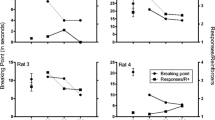Abstract
The roles of dispositional, physiological, and behavioral factors in the development of tolerance to the effects of arecoline on operant behavior were assessed. In Experiment I, rats were trained to press a lever on a variable-interval 15-s schedule for milk reinforcement. Dose-effect relationships were assessed prior to and during chronic arecoline (1.74 mg/kg/day) treatment. After 21 days of arecoline administration prior to each session, the dose-effect relationship for total number of responses did not shift. However, the dose-effect relationship for total number of reinforcers shifted to the right. In Experiment II, rats were trained to respond on a fixed-ratio 20 schedule for milk reinforcement. Dose-effect relationships were assessed prior to and during chronic arecoline (0.87 mg/kg/day) administration. One group of rats received daily injections of arecoline prior to the session and a second group received arecoline injections 30 min after the session. Daily administration of arecoline resulted in a greater shift to the right of the dose-effect relationship for the presession group than it did for the postsession group. These data demonstrate the importance of behavioral factors in the development of tolerance to arecoline.
Similar content being viewed by others
References
Baker RW, Chothia CH, Pauling P, Petcher TJ (1971) Structure and activity of muscarinic stimulants. Nature 230:419–445
Boren JJ, Navarro AP (1959) The action of atropine, benactyzine and scopolamine upon fixed-interval and fixed-ratio behavior. J Exp Anal Behav 2:107–115
Bruning JL, Kintz BL (1968) Computational handbook of statistics. Scott, Foresman and Company, Glenview
Chen CS (1968) A study of alcohol tolerance effect and an introduction of a new behavioral technique. Psychopharmacologia 12:433–440
Corfield-Sumner PK, Stolerman IP (1978) Behavioral tolerance. In: Blackman DE, Sanger DJ (eds) Contemporary research in behavioral pharmacology. Plenum, New York, pp 391–448
Dews PB (1978) Behavioral tolerance. NIDA Res Monogr Ser 18:18–26
Freedman DX, Appel JB, Hartman FR, Molliuer ME (1964) Tolerance to behavioral effects of LSD-25 in rat. J Pharmacol Exp Ther 143:309–313
Harris RT, Waters W, McLendon D (1972) Behavioral effects in rhesus monkeys of repeated intravenous doses of Δ 9-tetrahydrocannabinol. Psychopharmacologia 21:297–306
Herz A (1963) Excitation and inhibition of cholinoceptive brain structures and its relationship to pharmacological-induced behavior changes. Int J Neuropharmacol 2:205–216
Herz A, Holzhauser H, Teschemacher H (1967) Central nicotine- and muscarine-like properties of cholinomimetic drugs with regard to their lipid solubility. Ann NY Acad Sci 142:21–26
Kawamura H, Domino EF (1969) Differential actions of m- and n-cholinergic agonists on the brain stem-activating system. Int J Neuropharmacol 8:105–115
Le Blanc AE, Kalant H, Gibbins RJ (1976) Acquisition and loss of behaviorally augmented tolerance to ethanol in the rat. Psychopharmacology 48:153–158
Le Blanc AE, Poulos LX, Cappell HD (1978) Tolerance as a behavioral phenomenon: Evidence from two experimental paradigms. NIDA Res Monogr Ser 18:72–89
Meltzer LT, Rosecrans JA (1981) Discriminative stimulus properties of arecoline: A new approach for studying central muscarinic receptors. Psychopharmacology 75:383–387
Olds ME, Domino EF (1969) Comparison of muscarinic and nicotinic cholinergic agonists on self-stimulation behavior. J Pharmacol Exp Ther 166:189–204
Pradhan SN, Dutta SN (1970) Behavioral effects of arecoline in rats. Psychopharmacologia 17:49–58
Schuster CR, Dockens WS, Woods JH (1966) Behavioral variables affecting the development of amphetamine tolerance. Psychopharmacologia 9:170–182
Tang M, Falk JL (1978) Behavioral and pharmacological components of phenobarbital tolerance. NIDA Res Monogr Ser 18:142–148
Woolverton WL, Balster RL (1979) Tolerance to the behavioral effects of phencyclidine: The importance of behavioral and pharmacological variables. Psychopharmacology 64:19–24
Author information
Authors and Affiliations
Rights and permissions
About this article
Cite this article
Meltzer, L.T., Rosecrans, J.A. Tolerance to the disruptive effects of arecoline on schedule-controlled behavior. Psychopharmacology 77, 85–93 (1982). https://doi.org/10.1007/BF00436104
Received:
Accepted:
Issue Date:
DOI: https://doi.org/10.1007/BF00436104




